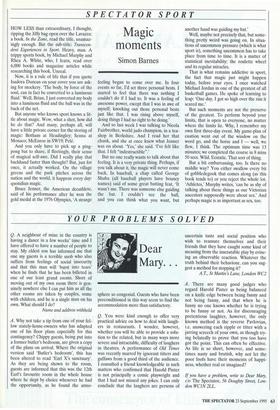SPECTATOR SPORT
Magic moments
Simon Barnes
HOW LESS than extraordinary, I thought, ripping the Jiffy bag open over the Lavazza: a book. In the Zone, read the title, unamaz- ingly enough. But the sub-title: Transcen- dent Experiences in Sport. Heavy, man. A trippy sports book, by Michael Murphy and Rhea A. White, who, I learn, read over 6,000 books and magazine articles while researching this book. Unreal.
Now, it is a rule of life that if you quote Isadora Duncan on your cover you are ask- ing for mockery. 'The body, by force of the soul, can in fact be converted to a luminous fluid.' Well, Brian, I just converted my body into a luminous fluid and the ball was in the back of the net.
But anyone who knows sport knows a lit- tle about magic. Wow, what a shot, how did he do that? And many, perhaps all, will have a little private corner for the storing of magic: Botham at Headingley; Senna at Monaco; McEnroe in SW19; Pei& And you only have to pick up a ping- pong bat to share, if fleetingly, their sense of magical self-awe. Did I really play that backhand faster than thought? But, just for once, it actually worked. On the village greens and the park pitches across the nation and the world, it happens every day: quotidian magic.
Bruce Jenner, the American decathlete, said of his performance after he won the gold medal at the 1976 Olympics, 'A strange feeling began to come over me. In four events so far, I'd set three personal bests. I started to feel that there was nothing I couldn't do if I had to. It was a feeling of awesome power, except that I was in awe of myself; knocking out those personal bests just like that. I was rising above myself, doing things I had no right to be doing.'
And so last week I was talking to Nicola Fairbrother, world judo champion, in a tea- shop in Berkshire. And I read her that chunk, and she at once knew what Jenner was on about. 'Yes,' she said. 'I've felt like that. I felt "indestructible".'
But no one really wants to talk about that feeling. It is a very private thing. Perhaps, if you talk about it, the magic will never come back. In baseball, a chap called George Shuba (all baseball players have bouncy names) said of some great batting feat, 'It wasn't me. There was someone else guiding the bat. I couldn't see the ball, and you can think what you want, but another hand was guiding my bat.'
Well, maybe not precisely that, but some- thing pretty weird was going on. In situa- tions of uncommon pressure (which is what sport is), something uncommon has to take place from time to time. It is a matter of statistical inevitability: the roulette wheel and its regular miracles.
That is what remains addictive in sport, the fact that magic just might happen today, before your eyes. I once watched Michael Jordan in one of the greatest of all basketball games. He spoke of learning to leap: 'One day, I got so high over the rim it scared me.'
But such moments are not the preserve of the greatest. To perform beyond your limits, that is open to everyone, no matter where the limits lie. Why, I remember my own first three-day event. My game-plan of caution went out of the window on the word go, and the horse and I — well, we flew, I think. The optimum time was 13 minutes; we completed the course in 8 mins 50 secs. Wild. Ecstatic. That sort of thing.
But a bit embarrassing, too. Is there no middle way? You either swallow every bit of gobbledegook that comes along (as this book tends to) or you reject the whole lot. 'Athletes,' Murphy writes, 'can be as shy of talking about these things as our Victorian ancestors supposedly were about sex.' And perhaps magic is as important as sex, too.


































































 Previous page
Previous page